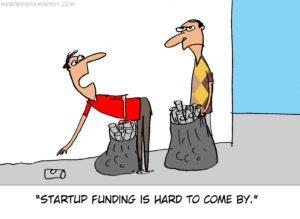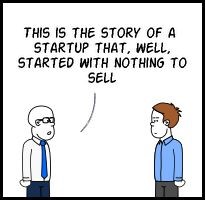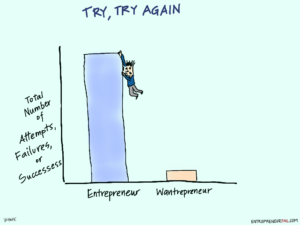 From the boardroom to the cafeteria, the moment you decide to turn your life around and become an entrepreneur, you get bombarded with these terms so commonly used in the ecosystem. You didn’t realize that this new, exciting and risk-taking life comes with a language of its own, and that your new job is to learn it as quickly as you can. What are the ‘true meanings’ of these terms? Here’s a list that will make you look (and feel) smarter, but please use them as sparingly as possible:
From the boardroom to the cafeteria, the moment you decide to turn your life around and become an entrepreneur, you get bombarded with these terms so commonly used in the ecosystem. You didn’t realize that this new, exciting and risk-taking life comes with a language of its own, and that your new job is to learn it as quickly as you can. What are the ‘true meanings’ of these terms? Here’s a list that will make you look (and feel) smarter, but please use them as sparingly as possible:
A
Accelerator – A program designed to help grow your startup at advanced stages through mentorship, workshops, office space or funding.
AR (Augmented Reality) – A technology that adds a layer of computer-generated sights and sounds to your real world.
AI (Artificial Intelligence) – A technology that allows machines to be programed to think and learn like humans.
Angel Investor – Someone who believes in your startup enough to invest their own money in it.
Advisory Board – A team of experts that support your startup and mentor you.
B
Bootstrap – Building your company without outside investment money.
Business Model – The master plan you set on how your company is going to make money.

Photo Credits: Webdesignerpot.com
C
Crowdsource – When you use the internet to obtain money or information from a large group of people.
Coaching – A business coach will guide and assist you in thinking strategically to grow your business.
CAC (Customer Acquisition Cost) – How much you need to pay in order to acquire one user of your product.
Churn Rate – How many customers you are losing in a specific period of time.
Conversion Rate – How many (web) visitors or leads you turn into paying users or customers.
D
Disruptive – game-changing, when you set out to revolutionize your sector or industry.
Deck – Just a fancy word for a PowerPoint presentation.
Due Diligence – When an investor makes his studies to confirm all facts about your startup before investing in it.
E
Exit – The sale of your company in the public markets, to another company or private investors.
Entrepreneur – A person with enough courage to risk his money, career, sanity, marriage and time to launch a successful startup by failing first and failing fast.
F
Freemium – an internet business-model where basic services are provided free of charge while more advanced features must be paid for.
FFF – Friends, family and fools who believe in you enough to invest in your startup before anyone else. Investors will look for that when you pitch for money.

Photo Credits: whiteboardmeg.com
G
Growth-hacking – When you use creative and less expensive measures, outside traditional forms of marketing, to get your clients.
Gamify – Applying elements of game playing such as point scoring and competing with others to encourage engagement with your product or service.
H
Hackathon — A weekend or day-long competition to create software or hardware products.
Hack – Find a way to do it faster, cheaper and better.

Photo Credits: Contriber.com
I
Iterate – Try something new, even if it goes wrong, try again, and in a slightly different way, to achieve a better result.
IPO – Initial Public Offering, or the big day your business enters the Stock Market.
IP (Intellectual Property) – The ideas, information and knowledge that need to be protected if your startup depends on them.
IoT (Internet of Things) – Connecting any hardware device to the internet to collect data generated from sensors connected to it.
Ideate – A fancy word for coming up with ideas. Same family as ideathon and ideation.
Incubator – Supports startups in the first stages of building their company by providing them with the resources needed to survive.
L
Lean Startup – A practice for developing products and businesses based on ‘validated learning’, getting customer feedback quickly and often.
LTV (Lifetime Value) – How much a customer will be paying you for the period he’ll be using your product.
M
Monetize – When you stop providing your product or service for free and start charging for it.
MVP (Minimum Viable Product) – The first product your startup creates with enough features to make your first clients happy.
Mentoring – A mentor supports and encourages you to develop your business skills and maximize your potential.
N
NDA (non-disclosure agreement) – Contract made to protect confidential information shared between 2 parties.
P
Pivot – When you start with an idea and you change it to something else along the way.
Pain point – A problem needing to be solved, mostly belonging to your customer.
PoC (Proof-of-concept) – A complete cycle of your project, that proves that your idea works for at least one customer or some users.
Prototype – a first version of a product, whether software or hardware, built to test the concept.

Photo Credits: Dilbert.com
R
ROI (Return On Investment) – The gains you get back from your invested money.
S
Seed funding – The (small) amount of money you get in the beginning of your project, in order to prove that it works and can scale.
Scale Up – How you plan to grow your startup in terms of size, market, and demography.
SME (small-to-medium enterprise) – A company that is somewhere between small office/home office to an enterprise that has fewer than 250 employees.
Startup – When you structure, finance, launch and plan to grow your new business idea. Otherwise, you’re just a small business.
Soft landing – A controlled launch of your business in a new market with less risk and cost.
Serial Entrepreneur – An entrepreneur who is addicted to launching a startup, scaling it and moving on to a new one. Just like a serial killer, minus the killing.
U
Unicorn – Another name for a company valued over $1 billion.
UX (User Experience) – everything you need to know, think about or do in order to make sure you’re creating the right product for the right audience.
UI (User Interface) – The way you interact with a device or product including display screens, keyboards, a mouse and the appearance of a desktop.

V
Valuation – An estimation of the worth of your startup.
VC (Venture Capitalist) – When a VC invests in your company they use money trusted to them by investors to buy partial ownership of your business.
Value proposition – How does your product/service improve the life of your customer or why your customer should buy from you.
W
Wantrepreneur – Usually a person who has a dozen startup ideas and not a single startup (yet).

Photo Credits: techstars.com










